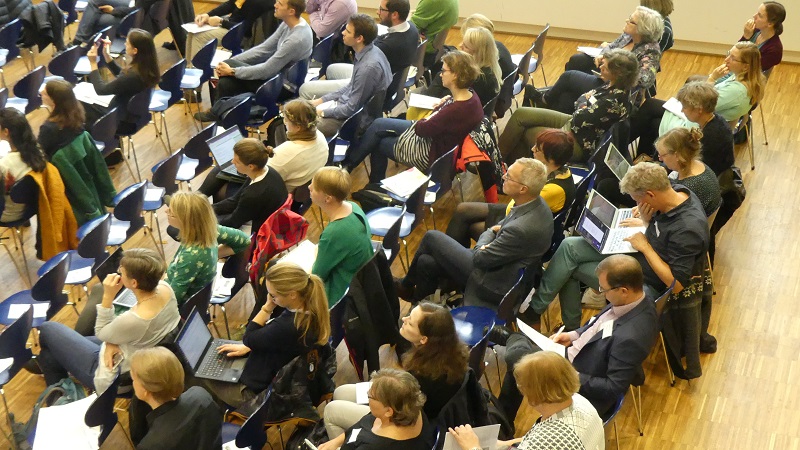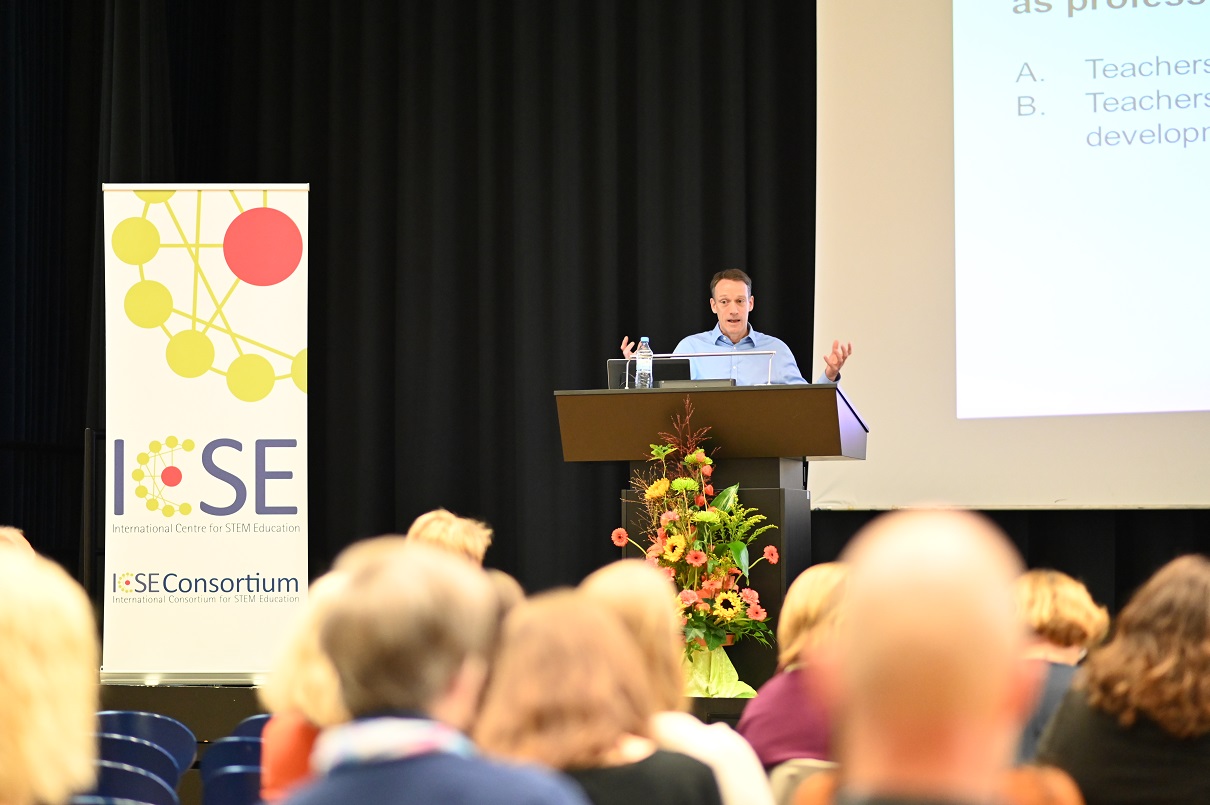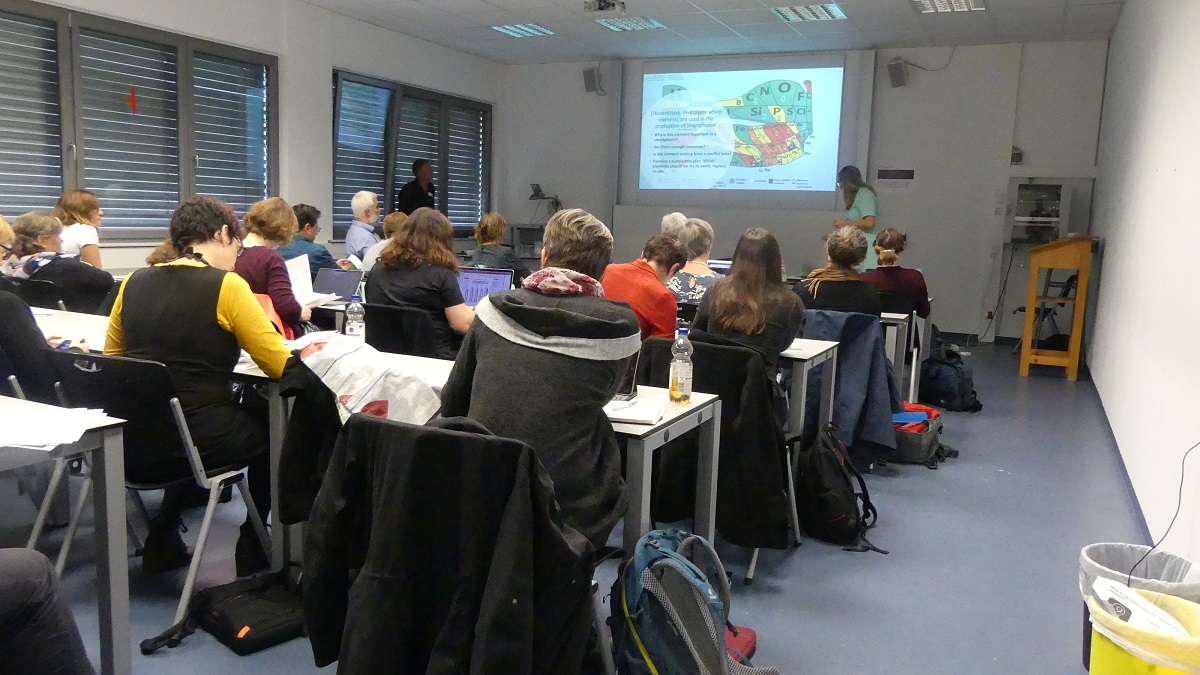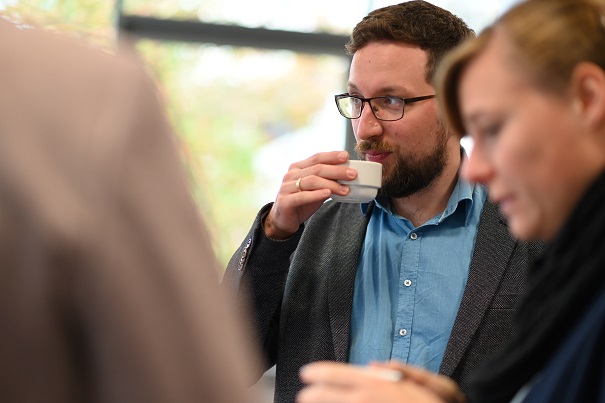A Report on the International Conference “Educating the Educators” at the University of Education in Freiburg
Assiyeah Joers
“Educating the Educators”, the third edition of the international conference series, took place this year on October 7 and 8 at the University of Education Freiburg. Stakeholders from the field of STEM education, researchers, teachers, policy makers and other like-minded people from all over the world came together to discuss different approaches to the scaling-up of STEM professional development.
With vibrant jazz, the two musicians of the Moment Notice’s Jazz Duo prepared the ground for a promising conference with exciting and innovative contributions. University of Education Rector Ulrich Druwe warmly welcomed the audience to the campus at the conference opening. Katja Maaß, Director of the International Centre for STEM Education (ICSE), then presented the projects and activities of ICSE and posed the central questions of the conference: How can we sustainably spread STEM education? How can we meet the challenges of professional development for teachers in mathematics and the natural sciences?

© Peter Maaß
Whether digitization or educational equity: STEM teachers need support
Michiel Doorman, one of the conference chairs, concluded the introduction by emphasizing the need for constant change in STEM education in digitalized times and led over to the presentation by the first keynote speaker, Prof. Kara Jackson of the University of Washington. She talked about equity in STEM education. A new support system in teaching, including workshops, coaching and time for collaboration between colleagues would be necessary to reach a larger number of students, Jackson said.
A reference framework for STEM education? And how do you bring photonics into the classroom?
The various workshops and lectures at ETE III were devoted to a wide variety of current issues in STEM education: Stephan Griebel, for example, put forward the idea of a uniform European reference framework for STEM in his workshop. A team from the Free University of Brussels enriched the audience with a lecture on Phablabs 4.0, a European project that uses workshops, challenges, and teaching materials to bring teachers and students closer to the world of photonics. The first day of the conference ended with a gala dinner at the “Waldsee” restaurant with good food, music and dance.

©Lars Holzäpfel
Bringing research, practice and policy together
Jim Ryder from the University of Leeds held the second keynote speech on Tuesday. He spoke about the relevance of research-informed recommendations for policy and practice in the scaling-up of professional development. Ryder argued for a meaningful education policy that supports the commitment of teachers to educational research, which has an impact on the professional development of teachers. He also asked whether such a scaling up could best be done with a bottom-up approach. Michiel Doorman, one of the conference chairs, suggested putting this issue on the agenda of the next ETE conference. It will take place next time at Doorman’s home University in Utrecht.
Relaxing breaks and an exciting policy seminar on cooperation
Between lectures, the different target groups had the opportunity to exchange ideas and establish new networks in the Network Lounge. During breaks, the lounge was used as a retreat for drinking coffee, relaxing or working. The ICSE photo box was a nice addition to the programme: here the participants could have a photo taken of themselves with their statements on what they like about STEM.
During the conference, the “MaSDiV Policy Seminar” took place for invited guests, where stakeholders from STEM education, education policy, research and industry from all over Europe discussed the importance of cooperation as a key for innovative STEM education. Katja Maass introduced the seminar and posed the question of how the future of education partnerships between companies, schools and universities in Europe could look like. According to Maaß, mutual trust and openness to each other’s needs are the basis of a successful partnership.
ETE goes practical: Escape Rooms, Materials Market and a “Discover Industry” truck
One of the big workshop topics on Tuesday were Escape Rooms in STEM classes. Scientists from Utrecht and Skopje shared their knowledge with the participants in two exciting workshops. They had to find solutions to the problem in a short time in order to achieve a common goal – interactive group fun with guaranteed thrills! This format is particularly suitable for introducing students to STEM topics in a playful way.
Another highlight of the conference was the Materials Market on Tuesday afternoon, where educational institutions and companies presented innovative teaching materials as well as exciting exhibits and concepts for STEM teaching. A robot was mixing cocktails for the guests, optical illusions amazed them and they learned how roller coasters could enrich physics lessons. In addition, the huge “Discover Industry” truck outside on campus invited visitors to explore. The two-storey exhibition vehicle with various workstations depicted a mobile industrial world in which young people could become active themselves and try out various activities. For example, it was possible to do a three-dimensional scan of yourself.

©ICSE

©Lars Holzäpfel
Final Keynote, Fire Show and Farewell – a successful conclusion to ETE III
Susanne Prediger of the DZLM, one of the main sponsors of the ETE, completed the line-up of keynote speakers on Tuesday afternoon with her lecture “Towards a research-base for supporting and educating the educators”. She presented this approach using practical examples from a research project on teacher professional development. Following this key note, Andrea Brunello from the Jet Propulsion Theatre used theatre methods to show how to spark curiosity and wonder for mathematics and science among students.
After that, the participants had the opportunity to see the Science Show by Joachim Lerch, Head of Science and Technology e.V. and founder of the Science Days in Europa Park, a famous German amusement park. On the stage of the auditorium, he thrilled the audience with spectacular fire experiments underlined by driving dancefloor beats. At the end of the conference on Tuesday evening, Prof. Katja Maass, Head of ICSE, once again thanked all participants of the event. They all made the ETE III a success, Maass said. At this point, the entire ICSE team would also like to thank our supporters (especially the University of Education Freiburg, DZLM, DFG and Erasmus+), friends and followers. It was a great event and we are looking forward to the next ETE in Utrecht!
Content and objectives of the ETE III:
In many countries, innovative teaching approaches promoted by STEM education researchers differ significantly from the everyday practice of teachers. To close this gap, we need more research to effectively implement innovative teaching methods. However, if this implementation is not limited to a single classroom, but concerns an entire school, many schools, a district, a federal state or even an entire nation, the challenges of spreading the new teaching concepts increase accordingly.
The aim of the conference series ‘Educating the Educators’ was and is therefore to look at the different approaches to the scaling-up of professional development in STEM education and to discuss ways of integrating innovative teaching methods, research-based and intercultural learning on a larger scale into STEM teaching.
Would you like to find out more? Visit out ETE page and the ETE Conference Book
